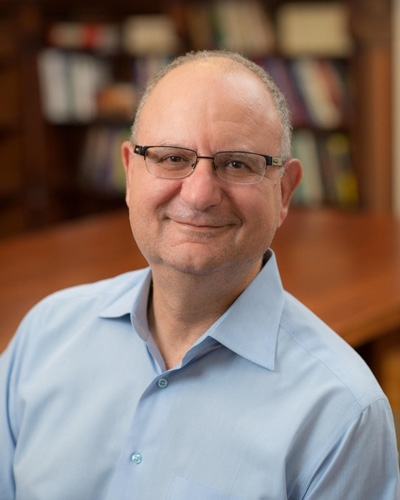You have /5 articles left.
Sign up for a free account or log in.

Beshara Doumani
Brown University
Beshara Doumani, a historian and scholar of Palestinian studies, says he has devoted his career "to studying the history of peoples, places and time periods that have been ignored by mainstream scholarship on the Middle East."
"My first book was on the social history of Palestinians during the Ottoman period, and my last book was on the history of family life in the Ottoman Mediterranean especially with regards to the question of gender and property," he says. "I'm also very interested in the Palestinian condition in general and want to be very supportive of scholars working in this field. This helps institutionalize the field and shape its research agenda."
Speaking of institutionalization of a field, Doumani, who has been at Brown University since 2012, assumed a new title in July as the Mahmoud Darwish Professor of Palestinian Studies, in what may be the first endowed professorship in Palestinian studies at a U.S. university. Brown also has an endowed post-doctoral fellowship in Palestinian studies.
The new chair in Palestinian Studies is the third endowed professorship to be established in Middle East studies at Brown in recent years. The chair, named after the Palestinian poet Mahmoud Darwish, was funded by a coalition of nine different donors.
"I just do not see how any school can have Middle East studies without having Palestinian studies," E. Paul Sorensen, a Brown alumnus and one of the donors for the professorship, said in a press release issued by Brown. "Palestinians are an integral part of the history and culture of the region."
At Brown, Doumani leads the New Directions in Palestinian Studies research initiative, which organizes a book series and hosts an annual thematic workshop soliciting scholarship on a given topic. Themes of recent workshops include "Who Owns Palestine?" and "Palestinian Homes and Houses."
"The emphasis here is on Palestinian studies, not only Palestine," Doumani says. "There's a distinction I'd like to make between the two. Of course they are related, but it's more than just a tomato/tomahto issue. 'Palestinian' shifts the focus from the object, land, to the subject, people. This means that this chair is concerned with Palestinians regardless of the geographic position." The first book in the New Directions in Palestinian Studies book series is about Palestinians in Chicago.
While chairs or centers in Israel studies have been established at dozens of U.S. universities, and there is at least one endowed professorship in a Jewish studies program focused on Israel/Palestine studies, Palestinian studies has a comparatively smaller institutional presence in the U.S. Doumani likened Israel versus Palestine studies to "a semitruck versus a bicycle in terms of funding and institutional support."
Columbia University has a Center for Palestine Studies, but Doumani said he is not aware of any other such centers in the U.S. There are at least two centers focused on Palestinian studies in Britain, at the University of Exeter and at SOAS, University of London.
Still, Doumani says the field of Palestinian Studies is growing in terms of the quantity and quality of its scholarship, and has attracted scholars from a broad array of fields, including anthropology, environmental studies, history, literature, political science, public health and sociology.
"There's always been a lot of pushback to including Palestine and Palestinians in academic conversations," Doumani said. "But due to the changing situation both in United States academic institutions -- for example a lot of social justice student activism -- and other reasons having to do with the changing political environment in the United States, Palestine and Palestinians are no longer taboo topics Over time once there was an opening it grew very quickly."
Doumani said there was no serious pushback to the professorship at Brown itself. "The university administration welcomed the position," he said. "It obviously approved the campaign to raise funds for the position. They obviously allowed New Directions for Palestinians."
"All that tells me that there is not really a problem from Brown. I'm proud of the university and all the different units that were involved in the process."
Brown has raised funds for more than 75 endowed chairs as part of a fundraising campaign launched in 2015. In addition to raising funds for Middle East studies, Brown has also focused on raising funds in the areas of Latin American and East and South Asian studies, according to Kevin McLaughlin, dean of the faculty, the George Hazard Crooker Professor of English and professor of Comparative Literature at Brown.
"The Palestinian community internationally is very, very happy about this," McLaughlin said of the Darwish professorship. "That's great. Our goal in raising a chair in this area is because we think the Middle East is an important part of the world and it's important for Brown to be doing research and teaching across a number of regions in this broad area, the Middle East. We had an opportunity to do this in Palestinian studies."
Not everyone is celebrating the milestone. A.J. Caschetta, a principal lecturer in the English department at Rochester Institute of Technology and a fellow with Campus Watch, an initiative that critiques Middle East studies programs, particularly over some professors' criticism of Israel, published an article in July accusing Brown of trying "to indoctrinate students and 'inform the community' about the evils of Israeli colonialism, while stamping its imprimatur on the virtues of the Palestinian cause."
"At a time when the foreign policy of the U.S. and much of the Arab world has diminished its support for the 'Palestinian issue' (a euphemism in its eighth decade), academia presses on, firmly in the Palestinian corner," Caschetta wrote. "Brown University's effort to out-Palestine Columbia University is just another indication of this trend in higher education. What great institution will next try to out-Palestine Brown and how? Perhaps we will soon see one of them endow a Yasser Arafat Chair."




